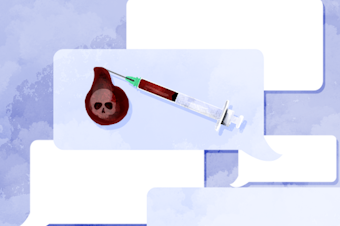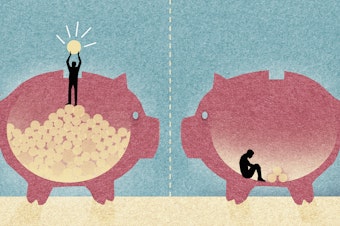Tara Boyle
Stories
-

Facts Aren't Enough: The Psychology Of False Beliefs
Sometimes, when we believe something, no amount of data can change our minds. This week, why we cling to our beliefs — even when they're wrong.
-

Where Does Religion Come From? One Researcher Points To 'Cultural' Evolution
If you've taken part in a religious service, have you ever stopped to think about how it all came to be? How did people become believers? Where did the rituals come from? And what purpose does it all serve? This week, we bring you a July 2018 episode with social psychologist Azim Shariff. He argues that we should consider religion from a Darwinian perspective, as an innovation that helped human societies to thrive and flourish.
-

All The World's A Stage—Including The Doctor's Office
Placebos belong in clinical trials, not in the doctor's office. At least, that's been the conventional wisdom for decades. This week, we ask whether placebos have more to offer than we've realized, and what they might teach us about healing. For research related to this episode, please visit: https://n.pr/2B9v2B0
-

Why No One Feels Rich: The Psychology Of Inequality
If you've ever flown in economy class on a plane, you probably had to walk through the first class cabin to get to your seat. Maybe you noticed the extra leg room. The freshly-poured champagne. Maybe you were annoyed, or envious. Social psychologist Keith Payne says we tend to compare ourselves with those who have more than us, but rarely with those who have less. This week, we explore the psychology of income inequality, and how perceptions of our own wealth shape our lives.
-

What Can A Personality Test Tell Us About Who We Are?
The desire to find our tribe is universal. We like to know who we are and where we belong. This fascination has led to a thriving industry built on the marketing and sale of personality tests. These tests offer individuals – and, increasingly, employers – quick and easy insights that can be used to make some of life's biggest decisions. But most fail to stand up to scientific scrutiny. This week, we revisit our 2017 episode about the world of personality testing, and explore the many different ways we assess personality and potential – from the Chinese zodiac to Harry Potter houses to the Myers-Briggs test.
-

Radically Normal: How Gay Rights Activists Changed The Minds Of Their Opponents
For generations, living openly as a gay person in the United States was difficult, and often dangerous. But there's been a dramatic change in public attitudes toward gay people. This week, we explore one of the most striking transformations of public attitude ever recorded. And we consider whether the strategies used by gay rights activists hold lessons for other groups seeking change.
-

Don't Panic: Stories Of Coping Amidst Chaos
Chaos is a part of all of our lives. Sometimes we try to control it. And other times, we just have to live with it. On this week's Hidden Brain, we bring you two of our favorite stories about coping with chaos. They come from our 2016 episodes "Panic in the Streets" and "Embrace the Chaos."
-

What Twins Can Tell Us About Who We Are
In December 1988, two pairs of twin boys were born in Colombia. One twin from each pair was accidentally given to the wrong mother — a mistake that wasn't discovered for decades. The twins' story is a tragedy, a soap opera, and a science experiment, all rolled into one. It also gives us clues about the role that genes and the environment play in shaping our identities. We talk with psychologist Nancy Segal about her work with twins, and her encounters with these now-famous brothers. For research related to this episode, please visit https://n.pr/2uvpvPe
-

Never Go To Vegas
All social classes have unspoken rules. From A-list celebrities to teachers, doctors, lawyers, and journalists — there are social norms that govern us, whether we realize it or not. This week on Hidden Brain, we look celebrity culture, as well as another elite group: the yoga-loving, Whole Foods-shopping, highly-educated people whom one researcher calls the new "aspirational class." This episode is from December 2017.
-

Love, Sex, And Robots
From stone statues to silicone works of art, we have long sought solace and sex from inanimate objects. Time and technology have perfected the artificial lover: today we have life-size silicone love dolls so finely crafted they feel like works of art. Now, with the help of robotics and artificial intelligence, these dolls are becoming even more like humans. This week we talk with researcher Kate Devlin about the history of the artificial lover, and consider what love and sex look like in the age of robots.